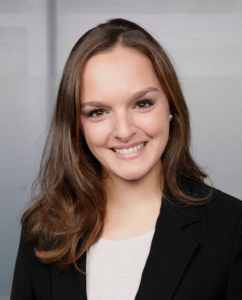Board of Directors
The Foundation for the Rights of Future Generations (FRFG) has one of the youngest boards in Germany. The board represents the foundation, organises projects, starts campaigns and draws up position papers. It manages the foundation’s funds and prepares the annual report.
 Grace Clover
Grace Clover
Grace is studying History and Modern Languages (German) in her final year at the University of Oxford, having recently completed a year abroad studying at the University of Bonn. In her first two years of studies she was active in the student union as the ‘Ethics and Environment Representative’ within her college, organising educational events about environmental protection and sustainability, and leading a sustainable food committee. She has also collaborated with the diabetes research charity Juvenile Diabetes Research Foundation (JDRF), raising awareness for their research and the experience of auto-immune disorders.
Main focus areas: sustainability, ‘long views’ on the future, social justice
 Luise Roither (Head and Speaker of the Board)
Luise Roither (Head and Speaker of the Board)
Luise is a healthcare economist and works in the field of R&D of medical technology innovations, for the future development of the healthcare system. In 2016, she founded her own initiative for the young generation in the health sector, Denkschmiede Gesundheit, which is now a part of FRFG. Luise has dedicated her professional and also part of her private life to the healthcare sector and is constantly on the lookout for people and organisations who share this enthusiasm and want to join her on the path towards a sustainable health sector.
Main focus areas: Healthcare, health policy, self-administration, financing issues of the care system, young networks in the health and care sector
 Christopher Isensee
Christopher Isensee
born in 1992, is a political scientist. The focus of his studies at the Martin Luther University Halle-Wittenberg, the Harz University of Applied Sciences in Halberstadt and the Masaryikova Univerzita in Brno (Czech Republic) was on political participation and theories of political change. Professionally, Christopher works in the field of development information and education.
Main focus areas: political participation, energy and environment, political consulting

Jörg Tremmel
is managing director of the FRFG. The philosopher and political scientist conducts research at the interface between philosophy and politics. Specifically, he is currently concerned with topics in political philosophy/political theory, ethics, epistemology, and various empirical political science issues.
His most important publications: Handbook of Intergenerational Justice (2006); A Theory of Intergenerational Justice (2012); Normative Political Theory (2020).
Board of Trustees
The Board of Trustees supports the board’s work.
 Prof. Dr. Rolf Kreibich
Prof. Dr. Rolf Kreibich
has been the director and managing director of the Institute for Future Studies and Technology Assessment in Berlin since 1981, a member of the Energy Advisory Board of the Berlin Senate since 1988, the scientific director of the International Building Exhibition Emscher Park of North Rhine-Westphalia since 1989, the director of the Secretariat for Future Research in Gelsenkirchen since 1990 and the chairman of the Committee for Emission Control of the State of Brandenburg since 1993. He has written ca. 400 publications on education, science and technology policy as well as on environmental, economic, labour and innovation policy and future research. His book publications include Ecological Production (1990), Futurology and Politics (1991), Sustainable Development — A Model for the Future of Economy and Society (1996) and Competitive Advantages through Ecological Services (1999).
 Prof. Dr. Dr. h.c. Ortwin Renn
Prof. Dr. Dr. h.c. Ortwin Renn
has been the scientific director of the Institute for Transformative Sustainability Research (IASS) in Potsdam since 2016. In 2012 he founded the Centre for Interdisciplinary Risk and Innovation Research at the University of Stuttgart (ZIRIUS), which he directed until 2017. He was also a Full Professor of Environmental and Technical Sociology at the University of Stuttgart. In addition to his involvement at the University of Stuttgart, Renn was a co-founder of the DIALOGIK research institute. He has occupied positions in numerous important committees, including the chairman of the Sustainability Advisory Board of the State of Baden-Württemberg from 2006 to 2012. Prof. Renn is the (co-)author of numerous publications in the field of technology and risk sociology.
Office Team
 Jörg Tremmel
Jörg Tremmel
is responsible for the scientific journal of the FRFG (Intergenerational Justice Review), the Intergenerational Justice Award, and the Walkshops of the FRFG. The main idea of the Walkshops is an expansion of knowledge can be fostered through physical movement (thus the combination of the words “workshop” and “walk” = “walkshop”). Participants are meant to absorb facts and understand concepts through auditory learning materials over the course of several days whilst hiking through nature. The previous walkshops took place on the topics “Climate crisis” (110 km) and “Coal phase-out” (44 km), “Search for a final storage site for nuclear waste” (40 km) and “Social security” (38 km).

Lena Winzer (project manager)
born in 2001, is currently in her final year of her MA (Hons) International Relations and Legal Studies degree at the University of Aberdeen in Scotland. While focusing on human rights and international institutions in her studies, she is also deeply involved in projects and activities outside of university. She is the president and treasurer of the Amnesty International society, works as a research assistant for Lawyers without Borders at university and has recently obtained the Youth Ambassador position at Safe Child Thailand. She has primarily delved into women’s rights on an international level and examined the illegality and consequences of the Russian attack on Ukraine. Furthermore, she has organised fundraising events, protests, and a “Write for Rights” event for Amnesty International on campus.
Additionaly, the office team is always supported by several young and highly dedicated interns.
Ombudsperson
The ombudsperson for the FRFG is Mr. Lars Gildner, Systemic Supervisor M.A..
He can be contacted by phone: 49/163/3658553 and/or by email: lars.gildner@web.de.
Anyone who feels mistreated by the SRzG or has a complaint can contact Mr. Gildner.


